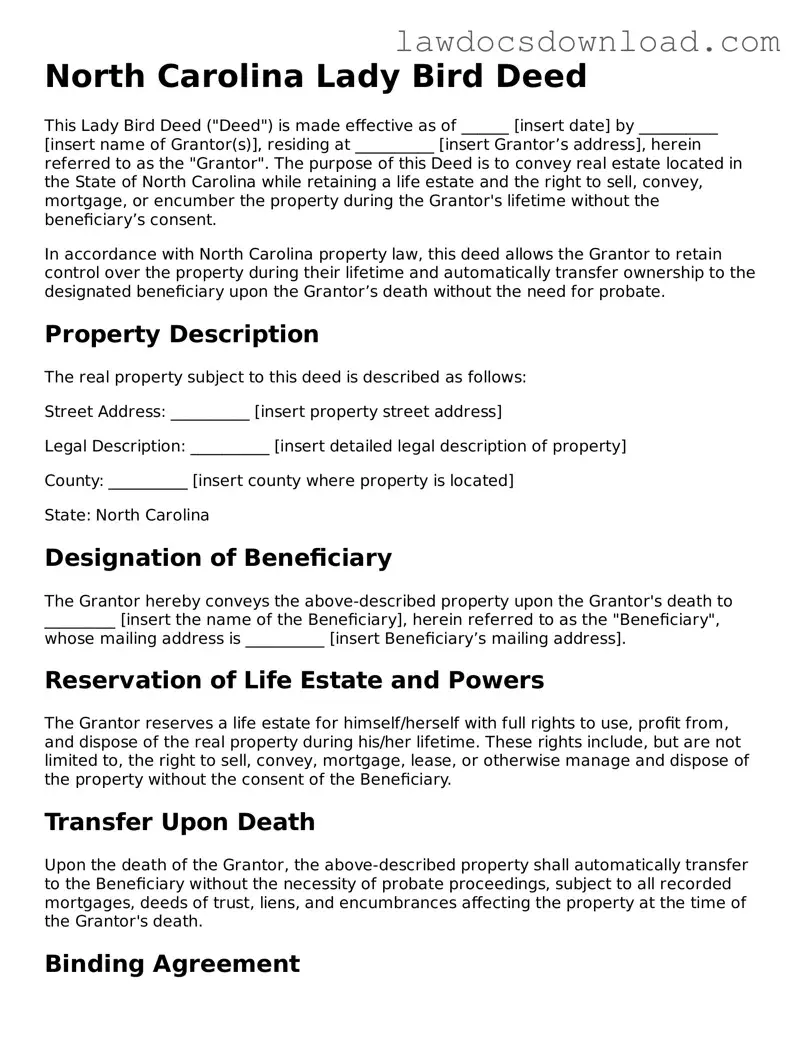North Carolina Lady Bird Deed
This Lady Bird Deed ("Deed") is made effective as of ______ [insert date] by __________ [insert name of Grantor(s)], residing at __________ [insert Grantor’s address], herein referred to as the "Grantor". The purpose of this Deed is to convey real estate located in the State of North Carolina while retaining a life estate and the right to sell, convey, mortgage, or encumber the property during the Grantor's lifetime without the beneficiary’s consent.
In accordance with North Carolina property law, this deed allows the Grantor to retain control over the property during their lifetime and automatically transfer ownership to the designated beneficiary upon the Grantor’s death without the need for probate.
Property Description
The real property subject to this deed is described as follows:
Street Address: __________ [insert property street address]
Legal Description: __________ [insert detailed legal description of property]
County: __________ [insert county where property is located]
State: North Carolina
Designation of Beneficiary
The Grantor hereby conveys the above-described property upon the Grantor's death to _________ [insert the name of the Beneficiary], herein referred to as the "Beneficiary", whose mailing address is __________ [insert Beneficiary’s mailing address].
Reservation of Life Estate and Powers
The Grantor reserves a life estate for himself/herself with full rights to use, profit from, and dispose of the real property during his/her lifetime. These rights include, but are not limited to, the right to sell, convey, mortgage, lease, or otherwise manage and dispose of the property without the consent of the Beneficiary.
Transfer Upon Death
Upon the death of the Grantor, the above-described property shall automatically transfer to the Beneficiary without the necessity of probate proceedings, subject to all recorded mortgages, deeds of trust, liens, and encumbrances affecting the property at the time of the Grantor's death.
Binding Agreement
This Deed is binding upon and shall inure to the benefit of the parties hereto, their heirs, successors, and assigns.
Governing Law
This Deed shall be governed by and construed in accordance with the laws of the State of North Carolina.
Execution
IN WITNESS WHEREOF, the Grantor has executed this Lady Bird Deed on the date first above written.
Grantor’s Signature: __________ [Signature of Grantor]
Grantor’s Name (Printed): __________ [Printed name of Grantor]
Notary Acknowledgment
STATE OF NORTH CAROLINA
COUNTY OF __________ [insert county]
On __________ [insert date], before me, __________ [insert Notary’s name], a notary public, personally appeared __________ [insert name of Grantor], who proved to me on the basis of satisfactory evidence to be the person(s) whose name(s) is/are subscribed to the within instrument and acknowledged to me that he/she/they executed the same in his/her/their authorized capacity(ies), and that by his/her/their signature(s) on the instrument, the person(s), or the entity upon behalf of which the person(s) acted, executed the instrument.
WITNESS my hand and official seal.
Signature of Notary Public: __________ [Notary’s signature]
Name of Notary Printed: __________ [Printed name of Notary]
My commission expires: __________ [Expiration date of Notary’s commission]

